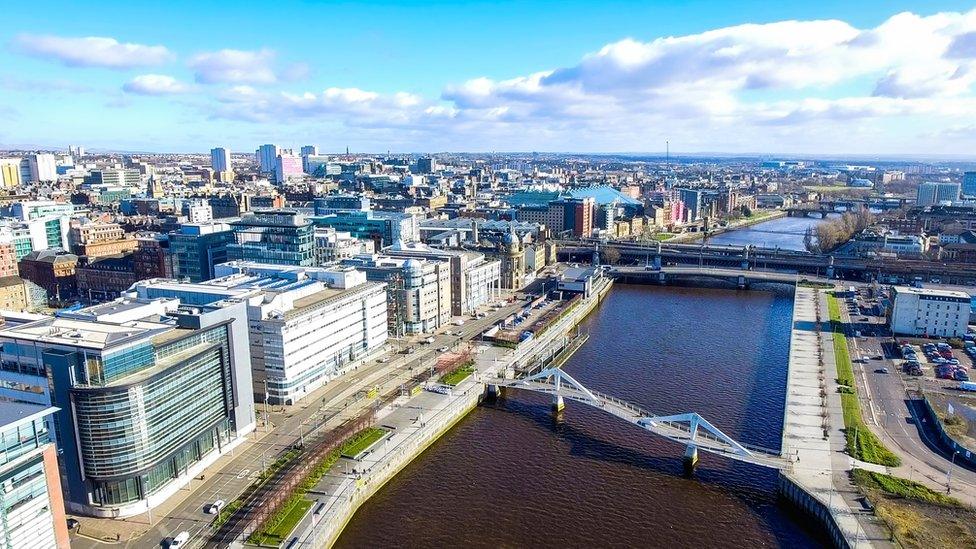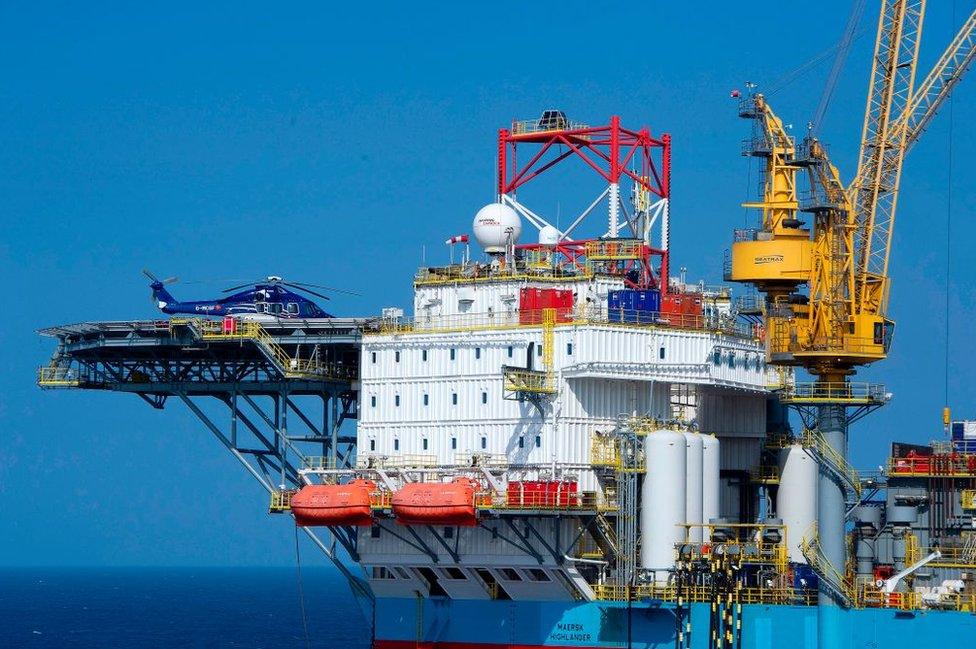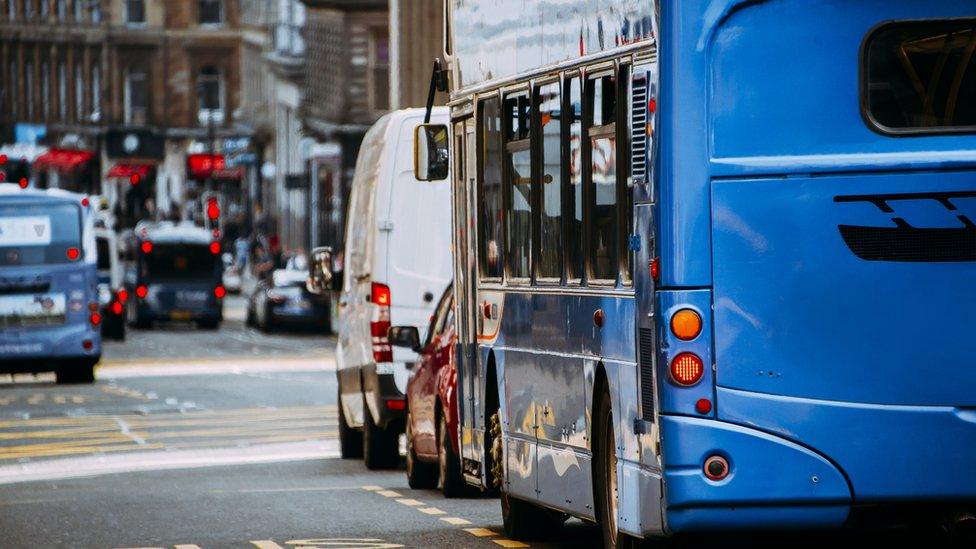Glasgow sets out ambitious climate change plan
- Published

If there's really a climate emergency, governments have realised they're going to have to do something about it. Local councils are at the sharp end of implementing change.
Glasgow City Council has just signed up to a hugely ambitious programme of proposals, to get to the net zero emissions target within only 11 years.
The radical change will be most obvious with transport, including at least a look at taking over the buses and making them free.
It extends to heating buildings, use of plastic, school meals and political leadership.
Glasgow - long nicknamed the Dear Green Place - wants to get greener. A lot greener.
That could be dearer too. But without a price tag, it just set out on a hugely ambitious task of getting to net zero climate changing emissions within only 11 years.
It is not alone in such ambitions. Other cities are going about the environmental cause in their own ways.
Edinburgh, for instance, this week signed up to something called Cities Can B - a movement dedicated to working together in the cause.
It's a vague set of ambitions and an odd mix. The Scottish capital is joining Barcelona, Córdoba in Argentina and Asunción in Paraguay.
This follows the widespread declaration of a climate emergency, with the Scottish Parliament and government committed, and the Westminster legislature too.
MSPs have just completed passage of a new law intended to force the pace and get to 'net zero emissions' (reducing carbon emissions and offsetting the remainder with measures to trap carbon) by 2045.
Keen to leave a legacy other than you-know-what, Theresa May joined in, with a 2050 target.
And while you may not have heard it, through the sound, fury and fog of the past week in politics, you might have missed the Labour Party conference commitment to getting to net zero by 2030.
Black stuff

The Institute of Fiscal Studies - already running a rule over Labour's plans with a view to an imminent election - said that might be nice, but it looks very expensive.
In welcoming the party's commitment, even Greenpeace sounded unconvinced that it's going to happen. Better to try and fail than not to commit, went the message.
You probably also missed that the Irish government announced it was phasing out oil drilling licences, followed by gas.
That's easier to do when you haven't found any. But it brings closer to home the dilemma facing the Scottish government, of how to maintain there's an emergency when the economy - and, for some, its fiscal hopes post-independence - depend more on the black stuff than the dear green stuff.
Emergency
National declarations and setting targets is easy. Putting them into practice is a lot trickier. Those at a more local level have much of the work to do.
That's what makes the Glaswegian example worth a closer look. Much of it could be applied across other council areas, particularly cities and towns.
It shows what might be done when the recycled rubber of climate change activism hits the cycle priority roadway of practicality.
The city council - SNP-led, for those who wish to make a party point - had set up a working group to look into the challenge, before the sense of emergency set in. But the group's resolve seems to have been stiffened by the fair wind the issue was receiving as it deliberated.
That's even though it's observations sometimes stray onto territory that's either puzzling, blunt or both: "The word 'emergency' is generally associated with there being an emergency," says the report.
It acknowledges the obvious charge that Glaswegians have more immediate concerns, such as poverty, housing and litter. The findings seek to align with those concerns, using the environmental revolution to meet social need.
Motor wars

That's not least in public transport. Glasgow has been slow to take on the dominance of the car. Having two motorways driven straight through its heart is a sign of where its priorities have been.
Road space for the private motorist has barely been constrained the way it has in Edinburgh. Parking in the West End is still cheap, and enforcement is poor.
But the new agenda will look to motorists like there's a war on, and they are the enemy.
New pro-cyclist priorities are called for, including segregated, quality commuting routes, plus an extension of pedestrian streets. Extension of the new central Low Emission Zone would be one of 61 recommendations, but instead it's the ultra-cautious "process and timescale for consulting" on doing so.
Last mile
Heavy goods vehicles will find it harder to get access through the city, and there is a commitment to look at consolidating deliveries and pick-ups - perhaps with bundled logistical services.
Incidental to this, Amazon - the online retail giant, at its US base - has just announced plans to get much greener. Between its packaging and its use of 'last mile' delivery vans, it has a lot it can do.
Back in Glasgow, there's talk of a metro system, though after Edinburgh's overspend, delays and disruption, it looks cautious.
A shorter term prospect is taking twin opportunities to overturn the buses.
One is a power granted to councils by Holyrood legislation to franchise services, allowing councils to be far more prescriptive about where and when buses run, at what price and in whose interest.
The other was presented by First Group wanting to offload its UK bus operations. The Aberdeen-based company dominates Glasgow buses.
Hydrogen cells
So the city's climate emergency working group is committed to working with other councils to see if there can be (I hesitate before using this very ugly word)... re-municipalisation.
In other, pleasanter words, reverting to the days when Ra Cooncil ran the buses and trams, and did so - as the report recommends - with one system and one timetable. And soon, using smart cards, with one through ticket. In the capital, with Lothian Buses, that's the way things remained since de-regulation in the 1980s, and it introduced a ticketing system that cleverly adjusts fares for multiple use, requiring the passenger to present no more than an ordinary debit card.
There's to be a formal assessment, subject to various cautious caveats, of the case for making public transport free to use. Scottish Labour has already made that a flagship policy for the next Holyrood election.
Staying with transport, the council has a fleet of diesel-fuelled vehicles it will eventually replace. Large trucks for rubbish collection are, I'm reliably told, not going to be much good on a battery. The future for them is more likely to be hydrogen-powered, though that's still at early stages of development for a mass market.
School meals

Council buildings, including schools, could convert from oil to gas burning boilers, but why not skip that step, it's suggested? All electric heating, or shovelling biomass into the furnace, perhaps?
There's talk of much more tree planting, and identifying unused land that can be 're-wilded' - turned over to nature to absorb carbon its own, time-honoured way.
In adopting the working group report, the council is now for an end to single use plastic and it commits to Scotland's first plastic-free shopping zone.
School pupils were consulted, and want to cut plastic out of their catering, with more sustainable grub.
On handling waste, Glasgow has one of Scotland's poorer records. It's a sign of the problems that the vastly over-budget, very late, new waste handling complex at Polmadie recently had its official opening, but the media was only informed the day after. That foot-dragging on waste will have to change, with better signposting of what to do with Weegie food waste.
Draft excluders
Housing has defined Glasgow for many decades - not always in a good way. It does so again, in presenting the challenge of shutting out the energy-wasting drafts from Victorian tenements and big old villas, many of them privately-owned.
New housing developments may face tougher housing standards, though they are set at Scottish government levels, and have been compromised by the demands of the housebuilders to keep costs down.
But at least there could be a requirement on new housing developments that they should all have land available to grow food.
Procurement could be required to pass a climate change test, as should all other council policies. And to pay for some of this, there's talk of issuing municipal climate bonds.
Wet and wetter
What's missing from this - though it may be elsewhere - is an assessment of how climate change could itself be a challenge to west central Scotland.
Some climate modelling suggests the wet west of Scotland could get wetter and the dryer east could get dryer still. Getting ready for exceptional weather events - if not heat or cold, then more wind and rain - might be for another report.
Will all this happen? Well, as Greenpeace said about Labour trying to do the same across the UK, the answer is probably 'no'.
But trying to make it happen - if the council is serious - will focus minds and redirect priorities quite radically. Incremental change is not an option, councillors have been told, and have agreed.
The cause of combating climate change may have more public support, but the range of vested interests - in business, among motorists and in allocating scarce resource - will make all this a very big task.
The growing demographic challenge, in handling demands for social care for instance, are also going to put strains on budgets and the tax base.
Having looked at the measures being pursued by other local authorities in the UK and around the world, there is a telling observation in the Glasgow working group report - that the key element of success for all of them "lies in the quality of leadership at political and executive level".
Councillors have set themselves a big test. Now they have to get to work, and to get the public on board, if they're going to pass it.
